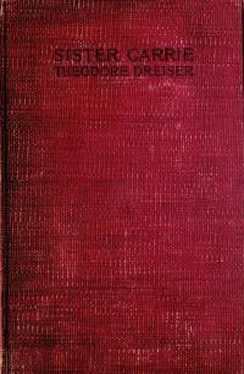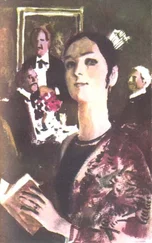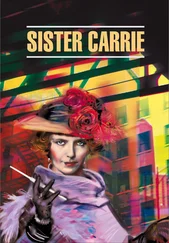Теодор Драйзер - Sister Carrie
Здесь есть возможность читать онлайн «Теодор Драйзер - Sister Carrie» — ознакомительный отрывок электронной книги совершенно бесплатно, а после прочтения отрывка купить полную версию. В некоторых случаях можно слушать аудио, скачать через торрент в формате fb2 и присутствует краткое содержание. Год выпуска: 2004, Жанр: Классическая проза, на английском языке. Описание произведения, (предисловие) а так же отзывы посетителей доступны на портале библиотеки ЛибКат.
- Название:Sister Carrie
- Автор:
- Жанр:
- Год:2004
- ISBN:нет данных
- Рейтинг книги:4 / 5. Голосов: 1
-
Избранное:Добавить в избранное
- Отзывы:
-
Ваша оценка:
- 80
- 1
- 2
- 3
- 4
- 5
Sister Carrie: краткое содержание, описание и аннотация
Предлагаем к чтению аннотацию, описание, краткое содержание или предисловие (зависит от того, что написал сам автор книги «Sister Carrie»). Если вы не нашли необходимую информацию о книге — напишите в комментариях, мы постараемся отыскать её.
Sister Carrie — читать онлайн ознакомительный отрывок
Ниже представлен текст книги, разбитый по страницам. Система сохранения места последней прочитанной страницы, позволяет с удобством читать онлайн бесплатно книгу «Sister Carrie», без необходимости каждый раз заново искать на чём Вы остановились. Поставьте закладку, и сможете в любой момент перейти на страницу, на которой закончили чтение.
Интервал:
Закладка:
"I'll just go down Broadway," he said to himself.
When he reached Forty-second Street, the fire signs were already blazing brightly. Crowds were hastening to dine. Through bright windows, at every corner, might be seen gay companies in luxuriant restaurants. There were coaches and crowded cable cars.
In his weary and hungry state, he should never have come here. The contrast was too sharp. Even he was recalled keenly to better things.
"What's the use?" he thought. "It's all up with me. I'll quit this."
People turned to look after him, so uncouth was his shambling figure. Several officers followed him with their eyes, to see that he did not beg of anybody.
Once he paused in an aimless, incoherent sort of way and looked through the windows of an imposing restaurant, before which blazed a fire sign, and through the large, plate windows of which could be seen the red and gold decorations, the palms, the white napery, and shining glassware, and, above all, the comfortable crowd. Weak as his mind had become, his hunger was sharp enough to show the importance of this. He stopped stock still, his frayed trousers soaking in the slush, and peered foolishly in.
"Eat," he mumbled. "That's right, eat. Nobody else wants any."
Then his voice dropped even lower, and his mind half lost the fancy it had.
"It's mighty cold," he said. "Awful cold."
At Broadway and Thirty-ninth Street was blazing, in incandescent fire, Carrie's name. "Carrie Madenda," it read, "and the Casino Company." All the wet, snowy sidewalk was bright with this radiated fire. It was so bright that it attracted Hurstwood's gaze. He looked up, and then at a large, gilt-framed poster-board, on which was a fine lithograph of Carrie, life-size.
Hurstwood gazed at it a moment, snuffling and hunching one shoulder, as if something were scratching him. He was so run down, however, that his mind was not exactly clear.
"That's you," he said at last, addressing her. "Wasn't good enough for you, was I? Huh!"
He lingered, trying to think logically. This was no longer possible with him.
"She's got it," he said, incoherently, thinking of money. "Let her give me some."
He started around to the side door. Then he forgot what he was going for and paused, pushing his hands deeper to warm the wrists. Suddenly it returned. The stage door! That was it.
He approached that entrance and went in.
"Well?" said the attendant, staring at him. Seeing him pause, he went over and shoved him. "Get out of here," he said.
"I want to see Miss Madenda," he said.
"You do, eh?" the other said, almost tickled at the spectacle. "Get out of here," and he shoved him again. Hurstwood had no strength to resist.
"I want to see Miss Madenda," he tried to explain, even as he was being hustled away. "I'm all right. I——"
The man gave him a last push and closed the door. As he did so, Hurstwood slipped and fell in the snow. It hurt him, and some vague sense of shame returned. He began to cry and swear foolishly.
"God damned dog!" he said. "Damned old cur," wiping the slush from his worthless coat. "I—I hired such people as you once."
Now a fierce feeling against Carrie welled up—just one fierce, angry thought before the whole thing slipped out of his mind.
"She owes me something to eat," he said. "She owes it to me."
Hopelessly he turned back into Broadway again and slopped onward and away, begging, crying, losing track of his thoughts, one after another, as a mind decayed and disjointed is wont to do.
It was truly a wintry evening, a few days later, when his one distinct mental decision was reached. Already, at four o'clock, the sombre hue of night was thickening the air. A heavy snow was falling—a fine picking, whipping snow, borne forward by a swift wind in long, thin lines. The streets were bedded with it—six inches of cold, soft carpet, churned to a dirty brown by the crush of teams and the feet of men. Along Broadway men picked their way in ulsters and umbrellas. Along the Bowery, men slouched through it with collars and hats pulled over their ears. In the former thoroughfare business men and travellers were making for comfortable hotels. In the latter, crowds on cold errands shifted past dingy stores, in the deep recesses of which lights were already gleaming. There were early lights in the cable cars, whose usual clatter was reduced by the mantle about the wheels. The whole city was muffled by this fast-thickening mantle.
In her comfortable chambers at the Waldorf, Carrie was reading at this time "Père Goriot," which Ames had recommended to her. It was so strong, and Ames's mere recommendation had so aroused her interest, that she caught nearly the full sympathetic significance of it. For the first time, it was being borne in upon her how silly and worthless had been her earlier reading, as a whole. Becoming wearied, however, she yawned and came to the window, looking out upon the old winding procession of carriages rolling up Fifth Avenue.
"Isn't it bad?" she observed to Lola.
"Terrible!" said that little lady, joining her. "I hope it snows enough to go sleigh riding."
"Oh, dear," said Carrie, with whom the sufferings of Father Goriot were still keen. "That's all you think of. Aren't you sorry for the people who haven't anything to-night?"
"Of course I am," said Lola; "but what can I do? I haven't anything."
Carrie smiled.
"You wouldn't care, if you had," she returned.
"I would, too," said Lola. "But people never gave me anything when I was hard up."
"Isn't it just awful?" said Carrie, studying the winter's storm.
"Look at that man over there," laughed Lola, who had caught sight of some one falling down. "How sheepish men look when they fall, don't they?"
"We'll have to take a coach to-night," answered Carrie, absently.
In the lobby of the Imperial, Mr. Charles Drouet was just arriving, shaking the snow from a very handsome ulster. Bad weather had driven him home early and stirred his desire for those pleasures which shut out the snow and gloom of life. A good dinner, the company of a young woman, and an evening at the theatre were the chief things for him.
"Why, hello, Harry!" he said, addressing a lounger in one of the comfortable lobby chairs. "How are you?"
"Oh, about six and six," said the other.
"Rotten weather, isn't it?"
"Well, I should say," said the other. "I've been just sitting here thinking where I'd go to-night."
"Come along with me," said Drouet. "I can introduce you to something dead swell."
"Who is it?" said the other.
"Oh, a couple of girls over here in Fortieth Street. We could have a dandy time. I was just looking for you."
"Supposing we get 'em and take 'em out to dinner?"
"Sure," said Drouet. "Wait'll I go upstairs and change my clothes."
"Well, I'll be in the barber shop," said the other. "I want to get a shave."
"All right," said Drouet, creaking off in his good shoes toward the elevator. The old butterfly was as light on the wing as ever.
On an incoming vestibuled Pullman, speeding at forty miles an hour through the snow of the evening, were three others, all related.
"First call for dinner in the dining-car," a Pullman servitor was announcing, as he hastened through the aisle in snow-white apron and jacket.
"I don't believe I want to play any more," said the youngest, a black-haired beauty, turned supercilious by fortune, as she pushed a euchre hand away from her.
"Shall we go into dinner?" inquired her husband, who was all that fine raiment can make.
"Oh, not yet," she answered. "I don't want to play any more, though."
"Jessica," said her mother, who was also a study in what good clothing can do for age, "push that pin down in your tie—it's coming up."
Jessica obeyed, incidentally touching at her lovely hair and looking at a little jewel-faced watch. Her husband studied her, for beauty, even cold, is fascinating from one point of view.
Читать дальшеИнтервал:
Закладка:
Похожие книги на «Sister Carrie»
Представляем Вашему вниманию похожие книги на «Sister Carrie» списком для выбора. Мы отобрали схожую по названию и смыслу литературу в надежде предоставить читателям больше вариантов отыскать новые, интересные, ещё непрочитанные произведения.
Обсуждение, отзывы о книге «Sister Carrie» и просто собственные мнения читателей. Оставьте ваши комментарии, напишите, что Вы думаете о произведении, его смысле или главных героях. Укажите что конкретно понравилось, а что нет, и почему Вы так считаете.









